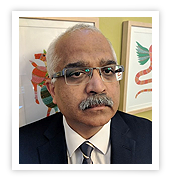About Us
A message from our director
Welcome to the Center for Environmental Politics!
Our mission is to play a leadership role in producing and disseminating social science research on environmental politics, policy, and governance at local, regional, national, and global levels. The Center’s 33 Faculty Associates are leaders in their fields and the 20 Graduate Fellows are working on exciting doctoral projects. Within the University of Washington, we facilitate faculty and graduate students to build connections, establish networks, and initiate truly multi‐disciplinary conversations about the political and institutional dimensions of environmental challenges. Externally, we are in the forefront of creating and nurturing a community of scholars committed to theoretically informed and empirically rigorous research on environmental politics and governance.
Why focus on politics, policy, and governance? Although there has been substantial progress in the development of technical and scientific knowledge about the causes of several environmental problems, the translation of these ideas into politically feasible policy regimes has been a major stumbling block. The repeated lessons of these failures underscore the basic point that environmental challenges pose distinctive political and policy challenges that need to be addressed with equal footing to their economic and technical dimensions. Therefore, the Center’s agenda is motivated by a core question: why are individuals and organizations not adequately motivated to address many environmental problems, despite the fact that the risks and costs associated with them are substantial and that attractive technical solutions to address them exist?
The Center hosts eminent faculty located across units such as political science, communications, geography, philosophy, history, anthropology, environmental and forestry sciences, American Indian studies, law, marine affairs, built environment, earth and space sciences, and international studies. These scholars write on subjects such as:
-
- Policy & Regulation: Both governmental regulation at the level of cities, states, countries, and global regimes, and new forms of non‐governmental regulations sponsored by non‐governmental actors and business firms.
- Policy Implementation, especially incentives for the regulatees to comply with the laws and directives, and the capacities of the regulators to enforce their mandates.
- Informational Signals such as eco‐labels that allow consumers to reward environmentally progressive firms.
- Political Communication, especially how framing of environmental issues in different media influences citizen reaction, legislative activity, as well as business response.
- Environmental Advocacy by environmental groups aimed at both governments and business firms.
- Sustainability Policies, such as maintaining the fertility and productivity of earth and ocean resources.
- Environmental Justice in the context of various underprivileged communities within the US and abroad.
The key activities of the Center include: (1) the multi-disciplinary monthly Duck Family Colloquium Series, (2) the annual Duck Family Graduate Student Conference, (3) the Duck Family Whidbey Island Retreat, (4) the Doug and Maggie Walker Environmental Conversations, and (5) the Richard Wesley Graduate Fellowship program.
I am grateful to the Department of Political Science and the College of Arts and Sciences for their support. Importantly, I am grateful to Susan (who passed away in 2015) and Gary Duck who have provided resources to fund several of our activities. Gary and Susan are UW alumni and have generously supported the political science department over several years. Susan passed away in December 2015 after a prolonged illness.
Dick Wesley, who is with us no more, was a generous benefactor of the political science department and an important part of our intellectual activities. In 2015, the Center hosted the inaugural Richard B. Wesley Conference on Research Frontiers in Environmental Politics and Governance (EPG). The 2016 EPG conference was hosted by ETH Zurich, 2017 conference by Indiana University, Bloomington, the 2018 conference by Stockholm University, the 2019 conference by UC Santa Barbara, and the 2020 conference will be hosted by University of Oslo.
Public scholarship and public outreach is an important goal for the Center for Environmental Politics. With support from Maggie Walker, we have launched a new initaitive, Doug and Maggie Walker Environmental Conversations, that features prominent environmental leaders/practitioners who share their perspective on real-world environmental policymaking.
Mel Belding, a longitme supporter of the Center, has instituted the Mel Belding Travel and Research Grant to support the conference travel of Graduate Fellows associated with the Center.
I welcome your participation in the Center’s activities in any capacity as you deem fit. Should you have ideas on how we can do a better job of supporting the Center’s mission, feel free to contact me.
Regards,
Aseem Prakash
Professor, Department of Political Science
Walker Family Professor for the College of Arts & Sciences
Founding Director, UW Center for Environmental Politics

